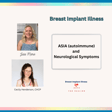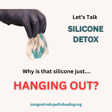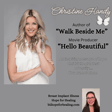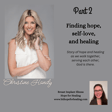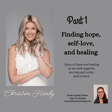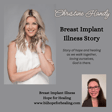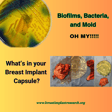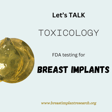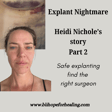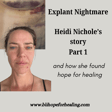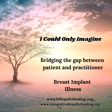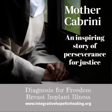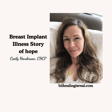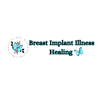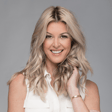Become a Creator today!Start creating today - Share your story with the world!
Start for free
00:00:00
00:00:01

Depression and Breast Implant Illness--Heidi Nichole's story
Depression can be a major factor in Breast Implant Illness. Heidi Nichole tells her intriguing story of Breast Implant illness associated depression. She found strength to heal and is now advocating for others, spreading BII awareness all over Austin, TX. Please visit Fly By Pedal Cab for more information.
Transcript
Introduction to the Podcast and Heidi's Story
00:00:01
Speaker
Hello, everyone. Welcome to Breast and Plant Illness, Hope for Healing. This is Cecily Henderson, your host. Thank you for joining me today. I have a very special friend on this podcast, and I would like to introduce her. Her name is Heidi Nicole. We met a few years ago on a Facebook Breast and Plant Illness group page. And ever since then, we have just been good friends and
00:00:27
Speaker
You know, kindred spirits and I would like her to share her journey of breast implant illness healing because it is a little different from some of the breast implant stories that I've heard. Heidi didn't really know that she had breast implant illness for a long time and even after ex-planting.
00:00:46
Speaker
And I'm going to let her tell you her journey and story because it's just really interesting and all the things that she has gone through.
Influence of Family on Body Image
00:00:56
Speaker
So Heidi, please introduce yourself.
00:01:00
Speaker
a little bit about your journey because I know it goes all the way back to your childhood. My mother was an RN and she helped with a lot of these surgeries, obviously. She ended up getting breast implants. I want to say when I was in my single digits, I guess I don't know what year she got them in. I know that it was done while we were gone in the summer at our dads. And so we didn't really know. I didn't realize all the surgeries. I think I remember her saying something about 10 surgeries because she kept having contracture.
00:01:29
Speaker
Um, and so, but then eventually it got, they got it right. And she's had the same set in since I was, you know, in, in my single digit years, I guess, and at 47 years. And so she had them growing up. So I was raised. I mean, of course you, you know, I've seen my mom's boobs, you know what I'm saying? That's what I thought boobs were supposed to look like. So how was I ever going to actually be happy with mine? You know what I'm saying? Like.
00:01:54
Speaker
I mean, that must have affected you. Well, I mean, you didn't know, but obviously it affected me because I went and got the stupid things
Depression and Accidental Detox
00:02:00
Speaker
later. So I had a friend tell me, someone that I was friends with, that she told me about breast implant illness. And she said that I should look into it and go into this group and look into it. And I was like, great, another problem. Every avenue of my life is affected right now. Every day I wake up, there's a new
00:02:20
Speaker
tornado coming through, something else that's messed up. I don't even know how I handled half the news, all the different newses. I don't know how I'm here today, but part of it obviously God and you. But basically I decided to
00:02:36
Speaker
get in that group and I was blown away. I could not believe it. Mine were not painful, by the way, I, as far as I knew everything was fine. My symptoms now looking back. I mean, I knew I was depressed. I know
00:02:51
Speaker
I'm going to say about five years in is probably when this stuff started affecting me, but I was so incredibly depressed that I would go to doctors. I went to my doctor in 2015, and I was just like, something is wrong with me. Take my hormones. Something is wrong with me. I was so extremely depressed. And Tess came back, didn't see anything out of, you know, he was like, well, let me just write your prescription for your depression.
00:03:16
Speaker
And I'm not a pill popper. I don't really, I'm not a vaccinator. I don't, I don't, I think I know something deep down in my sight. I don't, anyway, I don't do all that stuff. So I didn't really get any help. Actually started pedicabbing after that doctor's appointment.
00:03:34
Speaker
And I will say, because of all the exercising and all the sweating and everything, that was actually helping me. And I think that's what helped me. My job actually helped me get here today too, because of all the sweating, because of all the exercising, because you
Realizing Breast Implant Illness and Making a Pact
00:03:49
Speaker
were detoxing. Oh, I was detoxing. I mean, I didn't know at this time.
00:03:53
Speaker
You know, that's about the time I started that. So all my major symptoms were probably fatigue. I didn't know why I was tired, more tired than a lot of my friends. I felt like I slept more. I'm like, why do I feel like I sleep more than people? Like I just wasn't functioning. I wasn't organizing stuff the way I always had. I always put, you know, I was getting this
00:04:11
Speaker
stacks of papers piled up and I'm like, why am I, I just, I knew something was off, but the doctors were not figuring out even though it was on their intake forms. And it's because they don't have the ICD-11 code and cause people don't know about this. So anyway, those are my symptoms. I explained it with a doctor in Austin. That is a whole other few podcasts of a story, but you're going to get it and it's going to be the details.
00:04:38
Speaker
every single awful detail that I should never have had to go through. So basically, but I explained in Austin, I knew a lot of stuff. My friend told me, met in that group, met you in that group. The best thing about that group that I wasn't in for very much longer, but wanted to meet up with
Health Struggles in a Moldy Environment
00:04:57
Speaker
you. And I knew you had your implants in still. So I'm waiting for you to get yours out. And then I think you
00:05:04
Speaker
I mean, we kept in touch, obviously, but I waited for you to get yours out. You were saying we made it packed. Yeah.
00:05:11
Speaker
Yeah, we made a pact that, hey, if I get mine out and I get better, then you're going to get yours out. Yeah, I was for sure. Because we really thought that we were hoping that this would help relieve our symptoms, right? Because we both didn't know. No, we thought we knew. But we were still going to second guess it, no matter what. You're still going to second guess it. You knew. You knew. Here's why I know for sure. Here's why I know for sure.
00:05:39
Speaker
Uh, you definitely heard me in my worst days. I mean, hysterical crying fits just so depressed, so down on myself, everything, everything, all the things. Um, I had all that going on. I bought a motor home about that time too, um, or a little bit after that. Um, and the motor home had mold in it. So I was living in a motor home with mold right here at my bed every night where I was sleeping. I mean, my pill is here and the mold's here. So for a little over two years.
00:06:07
Speaker
Um, so I had that going on too, which mold symptoms are the same as BII. Uh, a lot of them are the same. So I was already having all of those symptoms way before I got the motor home. And then when I got the motor home, then that slowly, like I was just having even more like breakdown and it was just, it was awful. So.
00:06:27
Speaker
Yeah, because when your body is exposed to silicone, it makes you more susceptible to other things like mold exposure.
Educational Initiatives Inspired by Struggles
00:06:35
Speaker
Candida. Yeah, Candida. Just because the body can't handle it, it's already trying to handle silicone in your system, which is very toxic.
00:06:42
Speaker
And just hearing all of the things that you went through, your terrible explant, the mold that you went through, you are the reason I created my courses. Is because I thought, if I had something for my dear friend who went through all this pain,
00:07:01
Speaker
if I would have had something out there for you, you know, to be able to have that knowledge and educate, maybe your experience could have been better. And it was just hard. Yeah, I definitely would have walked out of that doctor's office that day laughing at him. I can tell you that for sure.
00:07:18
Speaker
I'm finally better now enough because of Cecily's help, not because of my surgeon. He didn't do anything other than make me feel worse about myself, leading his office in tears, absolutely in tears, being a spectacle for their office as well. But I'm better now. I have processed it. I have dealt with it. And I'm better now to where I am at that point. I'm taking the time to do it.
00:07:42
Speaker
You guys need to know nobody should be paying 12 and $20,000 and then being treated like that. It's not. No, you don't do that. So I'm glad you made the course for everybody. That definitely works out. But I also, your functional medicine is what helped me.
00:08:00
Speaker
I don't care if you have breast implants. I think everybody at some point in their life, 20, 30 years old, or maybe even 40, but even 20. I mean, there's nothing wrong with 20. You do not understand all the toxins that we are getting.
00:08:15
Speaker
we're getting put around us. You have to take it. I would suggest everybody take a toxins test and a food allergy test, just so you know what's going on with your body. And I guarantee there's going to be something you fix. And you're going to be like, whoa, I didn't even know. And these doctors are awesome. Because you know, right? You have those tests. But I can't go to a regular doctor and get these tests. And insurance won't pay for it anyway, because it's actually going to help me. Again, another soap box that we can do another time.
00:08:46
Speaker
Functional medicine does help because then you're not guessing. I know that your recovery, I just remember talking to you and saying, Heidi, I'm sorry, but it's going to take you two years to heal. And that was so hard. I mean, it broke my heart to have to tell you that.
Healing Process and Detox Protocol
00:09:02
Speaker
But I know women expect, hey, I'm going to heal now. I hear all these stories. I'm going to heal right now. But it's not necessarily true. It's going to take some time. And then in addition, you have to do this protocol test. The women that are posting
00:09:05
Speaker
Oh, yeah, functional mess.
00:09:17
Speaker
day after surgery, few days after surgery, no. You have to detox. When the implants and the capsule comes out of your body, you still have a lot of the toxins in your body and your body is not gonna just go, okay, they're gone, we're all fixed. It's not how it works. And you are gonna feel better though, right? You're gonna feel better. I felt better after that first month. Felt better for sure. But at the same time,
00:09:45
Speaker
you're not being told, especially even by your doctors, the flare-ups. Exactly. So you get really disappointed and you're like, oh, it wasn't the breast and plants, because now I'm sick again. No. Man, these toxins are working out of your system. They don't just come out. Exactly. Mold can't just leave your system. You have to use stuff. So yeah, you're not, you're not. No, you need the protocol. You need to
Advocacy Campaigns and Visibility Efforts
00:10:09
Speaker
keep going. And you'll get to the point where I am now, where my two years, next month,
00:10:13
Speaker
I'm finally you're on this side, which is great. I didn't want to hear it. I had already endured 15 years of depression. I don't know how I made it out there. But from 2017 until I got my implants out, I was just nightmare after nightmare and I could not function. I couldn't, I couldn't handle anything coming at me in my life.
00:10:33
Speaker
And now? Yeah, now I can't. I wanted to, yeah, I want, because you are be like the most amazing BIA advocate and you're doing it in a fun, fun way. And I want you to tell people what you're doing. Because when I heard, when you told me what you're doing, I'm like, Oh my gosh, Heidi, you are awesome. This is great. I have a business here in Austin, obviously. And then
00:10:59
Speaker
Sitting during recovery, a month after recovery, or during recovery, I guess, I was sitting there and I was like, I can put ads on my bike. And I own my own business, my two bikes and whatever. And I just thought, I'm really pissed about this. I didn't have to go through any of this. And I don't, of course, you want to scream it from the top of the rooftops or everybody here. So that's what I wanted to do.
00:11:22
Speaker
So that's where my advocacy started. But I decided to do my ad campaign. And it was going to be, it's time to get real. I already dressed as Rosie the Arriveder. We cannot do it. We cannot do the breast implants. And it just all, my little creative mind, it just, yeah, it just sort of, it just kept coming to me. And I was like, I'm doing it. Somehow I, you know, I had a friend that was my photographer, a photographer, and she took pictures for me. And then I just, somehow I figured it out, got the ads printed, whatever. Somehow I raised enough money.
00:11:52
Speaker
to pay for the ads to be printed and put on my bike. Now I lost money not getting paid for South by ads and things like that. But you know, I was like, if they're not going to tell people, I'm going to tell them. I was like, I'm going to use my voice and I'm going to use my bikes.
Plans for Legislative Change and Awareness
00:12:06
Speaker
And I'm going to at least but you know, it was a really healing experience. I was venting.
00:12:10
Speaker
But it was very healing when I did that. I was playing the boom music. There's a song called Ditz on a Tricycle that's hilarious, which is the most perfect. I put boobs on there. I had a lot of sequin boobs, right? The sequin ones. Oh, sparkling glittery. But then they have sequin nipples.
00:12:29
Speaker
This year, because we did the KVU thing, we did a KVU interview with Jenny Lee, and she did awesome investigative reporting. She did a great job. And we had her so I had to, I had to make a little more professional for the news station. So we put little bikini tops on in this year. But yeah, there's gonna be more coming to that as well later too.
00:12:48
Speaker
You can see your interview online at KVUE. You can go to KVUE.com and then put breast implant illness on there. I think it's hiding Nicole. If you just put breast implant illness, all that stuff comes up. You got to do that with us, so that was fun. I'm in Austin doing that.
00:13:16
Speaker
you have another idea that you came up with, you know, this idea and you, you told Lisa and I was like, you know what, we should do a march. I think March is women's history month. And I know that March is breast implant awareness month. And here we are. I also have a huge event here, you know, media and music and film and whatever South by, and there's a lot of people here for that. So I was like, we should do a March. So like all those people find out. And then people be like, what's happening? And then put it on the news and then even more people find out. So,
00:13:47
Speaker
We finally found somebody else. So you got our third person that is going to help us because you and I are working on so much stuff. I mean, work in general and it's hard. So we're slowly getting our team of advocates together. I'm excited for that. I'm excited. And we'll have we will have news media coverage, which is great. We're getting we're putting the venue together.
00:14:08
Speaker
Um, you know, we put the word out there. We want as many women as possible and men, you know, we're okay. Anybody who wants to advocate. Yes, not even breast implant illness survivors are going through it. I want your families or friends that had to, cause you know how many of my friends suffered because of this? I mean, I've been so depressed. Who wants to have a depressed friend?
00:14:30
Speaker
Yeah, I think it's really important because we're trying to get that ICD-11 code put in as a diagnosis code for breast implant illness. That's the goal. We want legislature to really change that and be aware of that. And that's why we're going to be marching on the Capitol and having the news coverage. Eventually, we'd love to get it all over.
Conclusion and Resources for Support
00:14:55
Speaker
Right? I mean, if we could get it all over international, I mean, all over the world, next year, that would be great. But that's our biggest and then our goal. That's the goal. Well, if anybody's interested, please visit our website. It's a nonprofit website at www.integrativehopeforhealing.org. We have all the information up there. If you are sick or if you have any questions, you need help,
00:15:23
Speaker
you know, have especially with functional medicine, you can go to my website at biihealingisreal.com. And Heidi, how can people contact you if they want to have a pedicab or have or have questions? But I mean, yeah, I mean, Austin, you can just look at fly by pedal cab, it's on Google and Instagram or whatever you can go through the other of those if you would like to help or yeah, if you're just randomly hearing you're like, hey, but if you want to watch the KV thing, just look up KVU and breast and plant analysts, you'll be good. So
00:15:53
Speaker
Awesome. Thank you so much, Heidi, for joining me today. I love your tenacity and your advocacy that you're doing and all the efforts that you're making. Thank you. You too, man. We're definitely all a team in this together, so I can't do it all. Absolutely. Well, thank you for joining us today. And please, everyone, remember that there is hope in healing. God bless.
